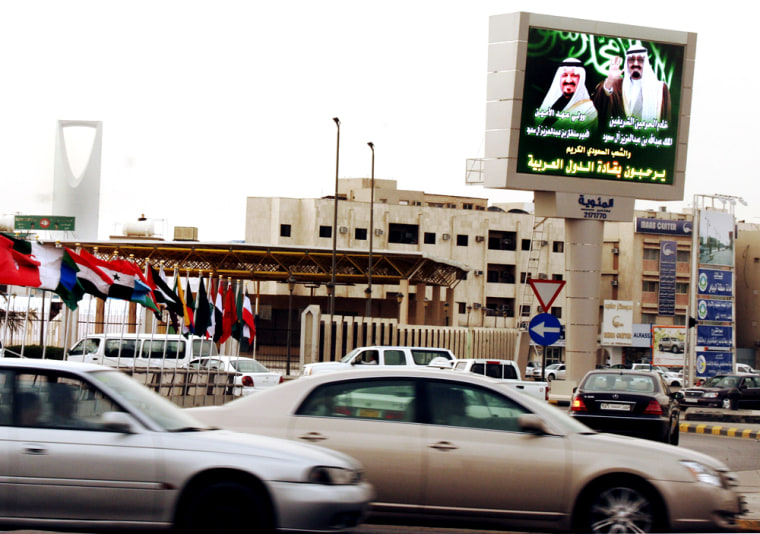It’s all the buzz in the Saudi capital — the two new skyscrapers that soon will soar upward from this city in the middle of flat and barren desert, taking their place above a row of chic new sidewalk cafes.
They are a sign of the kingdom’s flush of oil money. But they point to something else that surprised me on my first visit back in six years — a sense of stability, even confidence, that is rare across the Mideast these days.
Saudi Arabia, while clearly every bit as worried as its Arab neighbors about Iran’s new aggressiveness, Iraq’s spreading chaos and the United States’ waning influence, does not seem particularly panicked.
Transition, delicatessen-style
Instead inch by cautious inch, Saudi Arabia is proceeding along the path it has set for itself, slowly modernizing and embracing those ideas it likes from the West or from Muslim countries like Malaysia, while rejecting anything it feels could shake its conservative Islamic values or absolute monarchy.
The goal seems clear: To remain stable enough to withstand whatever comes next in the troubled Middle East. And if that sometimes offends longtime ally the United States in the process, Saudi Arabia seems willing.
None of that means sprawling, stifling Riyadh has blossomed into a progressive paradise.
Rather, I found the same mind-jangling mix of unbending tradition and ultramodern influences that so fascinated me — and sometimes frustrated me — when I lived here from 1999 to 2001.
Heads up! Religious police!
The fearsome religious police still roam the streets; eight people were arrested this week for allegedly beating to death a Saudi man accused of selling liquor. Stopping to buy a cup of coffee inside a luxury mall packed with Fendi and Prada, my companions and I saw two of the “muttawa” riding down an escalator, their robes floating delicately. We scrambled for our head scarves, fearing their screeches.
Women still aren’t allowed to drive, and the Bush administration’s push for widespread democratic elections seems as dead as the desert in summertime.
King Abdullah, who assumed the throne two summers ago, does seem to be quietly enabling limited social and economic reforms. But on the monarch’s power, he has remained firm — not even a constitutional monarchy is being considered, leaving the same lack of direct voice to ordinary people. On the key question of when Abdullah or his aged but powerful half brothers, the sons of Saudi Arabia’s founder, might pass the throne to a new generation, the ruling family remains utterly opaque.
Of keen interest to the West, the recent arrest of more than 100 men plotting terror attacks shows, too, that Islamic extremism still finds converts here. The security barricades that now snarl traffic across Riyadh prove no one believes that threat is gone.
That said, the government is slowly moving to reform its education system, both to stamp out extremism and the rote learning that kills entrepreneurial spirit. Mosque leaders now get government guidelines recommending they address never-before-broached subjects like domestic abuse, and preachers are watched lest they become too anti-Western.
Men and women, side by side
The country’s leaders recently announced they would set aside a third of government jobs for women. And in a few offices, we saw Saudi women openly working alongside Saudi male colleagues — something almost unknown six years ago.
Women still pull on the long, enveloping black cloak called the abaya and veil their faces when outside. But inside, they wore only loose head scarves and participated in meetings.
Perhaps just as importantly, the government has allowed in a handful of independent human rights groups and outside journalists, who have probed sensitive topics like the lack of rights for those sentenced to execution.
Six years ago, I met Saudi women journalists cloistered in a newspaper’s back room who struggled mightily to gather any information at all. This time, we watched a woman reporter aggressively text-message a high-ranking official, demanding answers and getting a response.
What's it mean for relations with U.S.?
What does this slow change, and new confidence, mean for Saudi Arabia and its relationship with the United States?
My family and I left Riyadh just weeks before the Sept. 11 attacks that badly rocked the U.S.-Saudi alliance. Americans blamed Saudis for allowing the religious extremism that drove the hijackers. Saudis called that unfair and dreaded the subsequent U.S. decision to invade Iraq.
Talking with officials here, it seems clear they believe Saudi Arabia’s long-term strategic interests still meld with America’s: Both sides want to contain or combat Iran, keep the region’s oil flowing and stabilize Iraq.
But there is bone-deep dismay with the current U.S. struggles in Iraq, and thus a pronounced willingness to take actions the United States may not favor. When King Abdullah recently called the U.S. presence in Iraq an illegal occupation, it may have shocked the West, but it made perfect sense in Riyadh.
It’s as if Saudi Arabia is saying: We share common goals on security, and we might even embrace some of the changes you wish for us. But we’re running our country, our way, like it or not.
